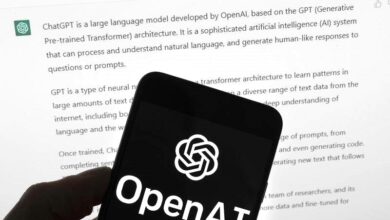How Artificial Intelligence Is Impacting Our Everyday Lives
AI in Daily Life:The Transformative Power of AI in Our Everyday Lives

AI in Everyday Lives: In today’s rapidly evolving technological landscape, Artificial Intelligence (AI) has emerged as a revolutionary force, permeating nearly every facet of our daily lives. From the way we communicate to how we shop, work, and even relax, AI has become an integral part of our existence, shaping the world around us in profound ways. In this article, we delve into the remarkable impact of AI in various domains and shed light on how it is reshaping our daily experiences.

AI-Powered Communication: Bridging Distances and Languages
One of the most noticeable ways AI has transformed daily life is through communication. With the advent of AI-powered translation tools, language barriers that once hindered global communication are rapidly dissipating. Apps and devices equipped with advanced natural language processing (NLP) algorithms can now seamlessly translate spoken and written content, enabling people from different corners of the world to engage in meaningful conversations. This newfound linguistic bridge has not only facilitated international business but has also fostered cross-cultural friendships and collaborations.
Enhancing Productivity and Efficiency
AI’s transformative influence extends to the workplace, where it has ushered in a new era of productivity and efficiency. Businesses are leveraging AI-driven automation to streamline routine tasks, allowing human employees to focus on more complex and creative endeavors. From automating data entry to optimizing supply chain management, AI is freeing up valuable time and resources, leading to higher job satisfaction and innovation.
Personalized Shopping Experiences
The retail landscape has undergone a remarkable shift, thanks to AI-driven personalization. Online retailers and platforms employ sophisticated AI algorithms to analyze consumer behavior and preferences, enabling them to offer tailored product recommendations. These recommendations, often based on past purchases and browsing history, enhance the shopping experience by presenting customers with items that resonate with their individual tastes. As a result, consumers are more likely to find products they love and make informed purchasing decisions.
AI in Healthcare: Transforming Patient Care
The healthcare sector is experiencing a profound transformation fueled by AI technologies. Medical professionals are now equipped with AI-powered diagnostic tools that can analyze medical images, such as X-rays and MRIs, with remarkable precision. These tools assist doctors in detecting diseases at early stages, leading to more effective treatments and improved patient outcomes. Additionally, AI algorithms are being used to predict disease outbreaks and analyze vast amounts of medical data, contributing to medical research and advancements.
Smart Cities for a Sustainable Future
AI is playing a pivotal role in shaping the cities of tomorrow. Through the concept of smart cities, AI technologies are being harnessed to create more sustainable and efficient urban environments. Intelligent systems monitor traffic flow, optimize energy consumption, and manage waste disposal, all while enhancing the overall quality of life for residents. As urban populations continue to grow, AI-driven smart city solutions are poised to address critical challenges and create a more sustainable future.
Entertainment and Creativity Unleashed
The entertainment industry is embracing AI-driven creativity in unprecedented ways. AI algorithms can now generate music, art, and even screenplays, blurring the lines between human and machine-generated content. Creative professionals are using AI tools to explore new avenues of artistic expression, leading to the emergence of unique and innovative works that captivate audiences around the world.
AI Ethics and Societal Considerations
While the integration of AI into daily life offers remarkable benefits, it also raises important ethical and societal considerations. As AI systems make decisions that affect various aspects of our lives, questions surrounding bias, transparency, and accountability come to the forefront. Striking the right balance between technological advancement and responsible AI deployment is crucial to ensure that the benefits of AI are realized without compromising fundamental human values.
AI in Daily Life: Transforming the Way We Live and Interact
In today’s rapidly evolving technological landscape, Artificial Intelligence (AI) has emerged as a revolutionary force, permeating nearly every facet of our daily lives. From the way we communicate to how we shop, work, and even relax, AI has become an integral part of our existence, shaping the world around us in profound ways. In this article, we delve into the remarkable impact of AI in various domains and shed light on how it is reshaping our daily experiences.
People also ask:
How is AI transforming communication in our daily lives?
AI has played a pivotal role in breaking down language barriers through advanced translation tools. These AI-driven solutions utilize natural language processing (NLP) algorithms to seamlessly translate spoken and written content, enabling people from different parts of the world to engage in meaningful conversations. This has not only facilitated global business interactions but has also fostered cross-cultural friendships and collaborations.
How is AI contributing to enhanced productivity in the workplace?
AI’s impact on productivity is profound, as businesses integrate AI-driven automation to streamline routine tasks. This allows human employees to focus on more complex and creative endeavors, leading to higher job satisfaction and innovation. Tasks like data entry and supply chain management are being automated, resulting in more efficient operations.
How is AI transforming the retail experience for consumers?
AI-driven personalization is revolutionizing the way we shop. Online retailers and platforms use sophisticated AI algorithms to analyze consumer behavior and preferences. These algorithms then provide tailored product recommendations based on past purchases and browsing history, enhancing the shopping experience and aiding customers in making informed decisions.
How is AI changing the landscape of healthcare?
AI is reshaping healthcare by providing medical professionals with powerful diagnostic tools. These AI-powered solutions can analyze medical images with high precision, aiding in early disease detection and leading to improved patient outcomes. Additionally, AI algorithms contribute to medical research by analyzing vast amounts of data and predicting disease outbreaks.
How is AI contributing to the development of smart cities?
AI technologies are instrumental in creating sustainable and efficient urban environments. Through smart city initiatives, AI-driven systems monitor traffic flow, optimize energy consumption, and manage waste disposal. These solutions enhance the overall quality of life for residents while addressing critical challenges posed by urbanization.
How is AI influencing the entertainment industry?
AI’s influence on entertainment is transformative, with algorithms generating music, art, and even screenplays. Creative professionals are embracing AI tools to explore new avenues of artistic expression, resulting in innovative and captivating works that captivate global audiences.
What ethical concerns arise from the integration of AI into daily life?
While AI offers numerous benefits, ethical and societal considerations come to the forefront. As AI systems make impactful decisions, questions of bias, transparency, and accountability arise. Striking a balance between technological advancement and responsible AI deployment is crucial to ensure that AI’s potential is harnessed while upholding fundamental human values.
How does AI bridge language barriers in daily interactions?
AI revolutionizes communication by employing advanced translation tools. Through natural language processing (NLP) algorithms, AI seamlessly translates spoken and written content, facilitating meaningful conversations among people from diverse linguistic backgrounds. This breakthrough has not only facilitated global business transactions but has also nurtured cross-cultural relationships and collaborations.
What are some examples of AI-powered communication tools?
AI-driven communication tools include language translation apps and devices, real-time language translation software, and chatbots that engage in multilingual conversations. These technologies contribute to breaking down language barriers and fostering effective communication on a global scale.
How is AI enhancing productivity in various industries?
AI transforms productivity through intelligent automation. Businesses leverage AI to automate repetitive tasks such as data entry, scheduling, and customer inquiries. By delegating routine operations to AI, human workers can focus on high-value tasks that demand creativity and problem-solving, leading to increased efficiency and innovation.
Can you provide examples of AI-powered productivity tools?
AI-powered productivity tools encompass virtual assistants, workflow automation software, and predictive analytics systems. These tools streamline business operations, optimize resource allocation, and provide valuable insights for informed decision-making.
How is AI shaping personalized shopping experiences?
AI-driven personalization redefines the retail landscape. E-commerce platforms utilize AI algorithms to analyze customer preferences and behavior, enabling them to offer tailored product recommendations. By presenting shoppers with items aligned with their tastes, AI enhances the shopping journey and contributes to higher customer satisfaction.
What role does AI play in customer engagement?
AI-driven customer engagement involves chatbots, virtual shopping assistants, and personalized email marketing campaigns. These AI applications provide personalized recommendations, answer customer queries, and offer a seamless shopping experience, ultimately driving customer loyalty and retention.
How is AI revolutionizing healthcare delivery?
AI is a game-changer in healthcare, empowering medical professionals with advanced diagnostic tools. AI-powered image analysis aids in the early detection of diseases, enhancing treatment outcomes. Moreover, AI assists in patient data analysis, enabling medical research breakthroughs and predictive insights for disease management.
Can you elaborate on AI’s role in medical imaging?
AI algorithms analyze medical images such as X-rays, MRIs, and CT scans with exceptional accuracy. This technology assists radiologists and clinicians in detecting anomalies and diseases, leading to faster and more precise diagnoses.
How is AI contributing to the development of smart cities?
AI fuels the evolution of smart cities by optimizing urban infrastructure and services. Intelligent systems monitor traffic patterns, manage energy consumption, and enhance waste management. These AI-driven solutions create sustainable, efficient, and livable urban environments.
What are the benefits of AI-enabled smart cities?
AI-enabled smart cities offer improved resource management, reduced traffic congestion, lower energy consumption, and enhanced public safety. Through data-driven insights, AI helps urban planners make informed decisions for a more sustainable future.
How is AI reshaping the entertainment industry?
AI unlocks new dimensions of creativity across entertainment sectors. AI-generated music, art, and content are captivating audiences worldwide. Creative professionals collaborate with AI tools to push artistic boundaries, resulting in innovative and engaging works.
What are some examples of AI-generated entertainment content?
AI-generated content ranges from music compositions and visual artworks to video game narratives. AI-driven algorithms analyze existing data and patterns to produce original and compelling creations.
What ethical concerns accompany the widespread use of AI?
The integration of AI raises ethical considerations, including algorithmic bias, data privacy, and job displacement. As AI systems make consequential decisions, ensuring fairness, transparency, and accountability remains paramount.



